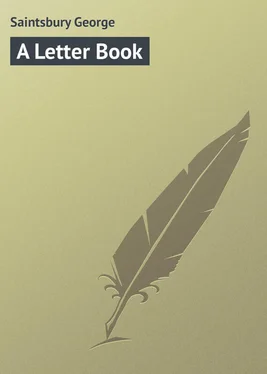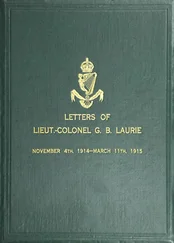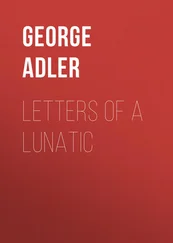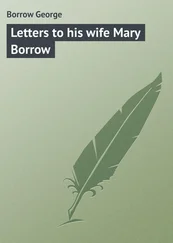George Saintsbury - A Letter Book
Здесь есть возможность читать онлайн «George Saintsbury - A Letter Book» — ознакомительный отрывок электронной книги совершенно бесплатно, а после прочтения отрывка купить полную версию. В некоторых случаях можно слушать аудио, скачать через торрент в формате fb2 и присутствует краткое содержание. ISBN: , Жанр: foreign_language, foreign_prose, на английском языке. Описание произведения, (предисловие) а так же отзывы посетителей доступны на портале библиотеки ЛибКат.
- Название:A Letter Book
- Автор:
- Жанр:
- Год:неизвестен
- ISBN:http://www.gutenberg.org/ebooks/31072
- Рейтинг книги:3 / 5. Голосов: 1
-
Избранное:Добавить в избранное
- Отзывы:
-
Ваша оценка:
- 60
- 1
- 2
- 3
- 4
- 5
A Letter Book: краткое содержание, описание и аннотация
Предлагаем к чтению аннотацию, описание, краткое содержание или предисловие (зависит от того, что написал сам автор книги «A Letter Book»). Если вы не нашли необходимую информацию о книге — напишите в комментариях, мы постараемся отыскать её.
A Letter Book — читать онлайн ознакомительный отрывок
Ниже представлен текст книги, разбитый по страницам. Система сохранения места последней прочитанной страницы, позволяет с удобством читать онлайн бесплатно книгу «A Letter Book», без необходимости каждый раз заново искать на чём Вы остановились. Поставьте закладку, и сможете в любой момент перейти на страницу, на которой закончили чтение.
Интервал:
Закладка:
But there is another sense of "loss" which has also to be reckoned. The framework of biography is, or at least ought to be, something more than a mere frame: and it distracts attention from the letters themselves, breaks up their continuous effect, and in many cases necessitates at least occasional omission of parts which an editor of them by themselves would not think of excluding. Of course this is no argument against the plan as such: but it has, together with what was said recently, to be taken into account when we compare the epistolary position of the last century with that of its immediate predecessor. 33 33 In which, be it remembered, the "Life-and-Letters" system only came in quite late.
These remarks are made not in the least by way of depreciating or even making an apology for nineteenth century letters, but only in order to put the reader in a proper state for critical estimation of them. Nor is it necessary to repeat – still less to discuss – the more general lamentations with some reference to which we started as to any decay of letter-writing. Provisos and warnings may be taken as having been made sufficiently: and we pass to the actual survey.
It may have been noticed in reference to the principal group of letter-writers in the eighteenth that, with the exception of Cowper, they were all acquainted with each other. Walpole knew Lady Mary, Chesterfield and Gray; while Gray, if he did not know the other two, knew Walpole very well indeed. Something of the same sort might be contended for among those whom we have selected on the bridge of the eighteenth and nineteenth. Wordsworth, Coleridge, Southey and Lamb were of course intimately connected: Southey knew Landor and Shelley, Keats knew Shelley, Wordsworth and Lamb; while Byron and Shelley, however unequally, were pretty closely yoked together. It is not meant that in all these groups everybody wrote to each other; but that the writing faculty was curiously prominent – diffused like a kind of atmosphere – in all. Now if we look in the nineteenth for such a group it will be found perhaps less readily. But one such at least certainly exists, to wit that which includes Tennyson, Thackeray, Edward FitzGerald, Carlyle and his wife, Fanny Kemble, Sterling and one or two more. There are of course numerous others outside this group, and even in it Tennyson himself is not a very remarkable letter-writer, any more than his great rival, Browning, was. But there was the same diffusion of the letter-writing spirit which has been noticed above, and Thackeray, FitzGerald, the Carlyles, and perhaps Fanny Kemble are quite of the greater clans among our peculiar people.
The most remarkable of all these – and as it seems to the present writer, one of the most remarkable of all English letter-writers is one whose letters have never been collected, 34 34 At the very moment when this is being written a considerable new body of them is announced for sale.
and from whom, until comparatively lately, we had only few and as it were accidental specimens. It is hoped that, notwithstanding the great changes of taste recently as to reticence or indiscretion, there are still many people who can not only understand but thoroughly sympathise with Thackeray's disgust at the idea of having his "Life" written; and the even greater reluctance which he would certainly have felt at that of having his letters published. But, as has been suggested on a former occasion, when things are published there is nothing disgraceful in reading them: and it may be frankly admitted that lovers of English literature would have missed much pleasure and the opportunity of much admiration if the "Brookfield" letters, those to the Baxter family and others in America, those finally included in the "Biographical" edition, and yet others which have turned up sporadically had remained unknown. It may be doubted whether there is anything like them in our literature – if indeed there is in any other – for the double, treble or even more complicated gift of view into character, matter of interest, positive literary satisfaction, and (perhaps most remarkable of all) resemblance to and explanation of the author's "regular literature," as it has been called. In some respects they resemble the letters of Keats; but there is absent from them the immaturity which was noted in those, and which extended to both matter and style. They are more various in subject and tone than Shelley's. They are not deliberately quaint like Lamb's; and they naturally lack (whether this is wholly an advantage or not, may admit, though not here, of dispute) the restraint 35 35 The word "restraint" may be misunderstood: but it is intended to indicate something of the general difference between "classical" ages on the one side and "romantic" or "realist" on the other.
which, in greater or less degree and in varied kind, characterizes the great eighteenth century epistolers.
One additional charm which many of them possess may be regarded by extreme precisians as of doubtful legitimacy as far as comment here is concerned: but this may be ruled out as a superfluous scruple. It is the illumination of the text "by the author's own candles" as he himself says in a well-known Introduction: the actual "illustration" by insertion in the script, of little pen-drawings. The shortcomings of Thackeray's draughtsmanship have always been admitted: and by nobody more frankly than by himself. But they hardly affect this sort of "picturing" at all. The unfortunate inability to depict a pretty face which he deplored need do no harm whatever: and his lack of "composition" not much. A spice of caricature is almost invariably admissible in such things: and the same tricksy spirit which prompted the hundreds of initials, culs-de-lampe etc. contributed by him to Punch and to be found collected in the "Oxford" edition of his works, was most happily at hand for use in letters. Some years ago there appeared, in a catalogue of autographs for sale, an extract of text and cut which was irresistibly funny. The author and designer had had a mishap by slipping on that peculiarly treacherous suddenly frozen rain for which (though we are liable enough to it in England and though some living have seen the entire Strand turned into one huge pantomime scene, roars of laughter included, as people came out of theatres) we have no special name. (The French, in whose capital it is said to be even more frequent, call it verglas .) In telling it he had drawn himself sitting (as involuntarily though one hopes not so eternally as infelix Theseus ) with arms, legs, hat, etcetera in disorder suitable to the occasion and with a facial expression of the most ludicrous dismay. It can hardly have taken a dozen strokes of the pen: but they simply glorified the letter.
In no sense, however, can the value and delight of Thackeray's letters be said to depend upon this bonus of illustration. Without it they would be among the most noteworthy and the most delectable of their kind. One sees in them the "first state" of that extraordinary glancing at all sorts of side-views, possible objections and comments on "what the other fellow thinks," which is the main secret in his published writings. If the view of him as a "sentimentalist" (which nobody, unless it is taken offensively, need refuse to accept) is strengthened by them, that absurd other view, which strangely prevailed so long, of his "cynicism" is utterly destroyed. We see the variety of his interests; the keenness of his sensations; the strange and kaleidoscopic rapidity of the changes in his mood and thought. And through the whole there runs the wonderful style which was so long unrecognised – nay, which those who go by the trumpery machine-made rules of "composition books" used gravely to stigmatise as "incorrect." Time lifts a great many (though not perhaps all) the restraints upon publication which have been discussed and advocated above: and it will probably be possible some day for posterity to possess, not only a collected body of the now scattered Thackeray letters, but a considerably larger one than has ever appeared even in extracts and catalogues. It will be an addition to our Epistolary Library which can bear comparison with any previous occupant of those shelves: and one of the books which deserve, in a very peculiar sense, the hackneyed praise of being "as good as a novel." For it will be almost the equivalent of an additional novel of its author's own – a William Makepeace Thackeray in the familiar novel-form of title, and in the old Richardsonian form of contents – but oh! how different from anything of Richardson's save that it might possibly make you hang yourself, not because you could not get to the story, but because you had come to the end of it.
Читать дальшеИнтервал:
Закладка:
Похожие книги на «A Letter Book»
Представляем Вашему вниманию похожие книги на «A Letter Book» списком для выбора. Мы отобрали схожую по названию и смыслу литературу в надежде предоставить читателям больше вариантов отыскать новые, интересные, ещё непрочитанные произведения.
Обсуждение, отзывы о книге «A Letter Book» и просто собственные мнения читателей. Оставьте ваши комментарии, напишите, что Вы думаете о произведении, его смысле или главных героях. Укажите что конкретно понравилось, а что нет, и почему Вы так считаете.












